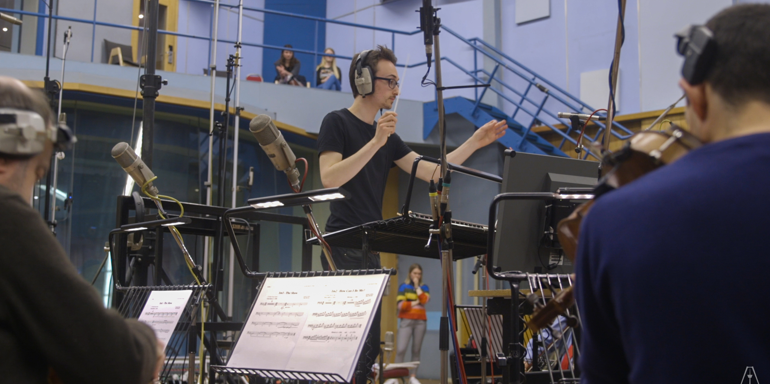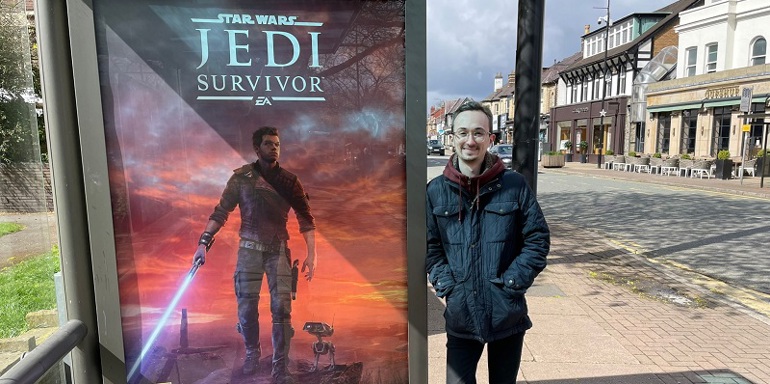
Course Studied: BA (Hons) Music (Production)
Year of Graduation: 2015
Top Career Highlights:
- Winning a GRAMMY award for his composition work on a critically-acclaimed Star Wars video game
- Working as an Orchestrator on Star Wars Jedi: Fallen Order
- Recording and conducting my own music at Abbey Road Studios
- Scoring additional music for NHNZ and Discovery Channel's 'Mysterious Planet'

Max McGuire spotting a Star Wars Jedi: Survivor poster in his hometown
Max McGuire, who studied Music Production, was part of the team that composed the musical score for Star Wars Jedi: Survivor by Respawn Entertainment and Lucasfilm Games.
The team won Best Score Soundtrack for Video Games and Other Interactive Media earlier this month at a star-studded ceremony in Los Angeles. Lead composers Stephen Barton and Gordy Haab collected the award on the night and the former namechecked Max for his role as assistant composer on the score.
Max, who watched the ceremony at home in Hale, shared with Altrincham Today that "it was actually really emotional - this industry is not easy and I've been through many years of really tough times. We've made financial sacrifices. To get to this point is fantastic."
Owner and Director of Metronomix Studios in Manchester, Max McGuire is an award-winning composer and orchestrator. An assistant for LA-based film composer Stephen Barton, Max’s recent output includes orchestrating over two hours’ worth of music for the EA game Star Wars Jedi: Fallen Order.
In 2018, Max recorded and conducted his score for ‘All the World’s A Stage’ at Abbey Road Studios. The short feature, directed by Florence Kosky featuring narration by Olivia Colman, went on to be selected for the Raindance Film Festival.
Elsewhere, Max’s music has been featured across US television networks such as E!, NBC, Syfy and the Discovery Channel’s Mysterious Planet. Here, Max discusses his musical experiences to date.
What attracted you to studying in Leeds and what do you think of the musical community here?
I looked around a number of universities searching for the course that I felt was right for me. I was immediately sold on Leeds Conservatoire by the facilities. I remember being utterly fascinated at the Open Day and at my interview by the recording studios. They were just mind-blowing, brimmed with equipment I'd read about and pined over in magazines - now it was all at my fingertips! Pretty much every room in the building had a stunning Steinway Grand and of course the practice rooms and studios were open until 3am. What more could any young musician want than to have access to such awesome equipment!?
The breadth of talent was also mesmerising. The quality of musicianship displayed across the different disciplines was clear from day one and the chance to work with such an eclectic mix of musicians was something I just had to experience.
The musical community was equally colourful. You could find a jazz bar, a pop gig, a classical recital and a heavy rock venue all within a few blocks of each other on any given night. All a stone's throw away from first year halls!
Could you briefly tell us a little bit about your career to date?
During my final year at Leeds Conservatoire I decided to start my own company and put everything into making a career in music possible – trying to ensure the smallest possible gap between finishing and moving into the industry. In my final year at Leeds Conservatoire we had a module that was based around the business side of things, marketing, music law and the practicalities of working in music for a living. I was inspired by these classes because it made my dream of making a living seem like a tangible reality. I originally setup the company with a friend from my hometown of Manchester and we contributed music to various libraries (some of which still earns money through PRS). We scored a bunch of short films and indie games too (of varying quality).
A couple of years ago I decided to go it alone and managed to secure a position as assistant to LA-based composed Stephen Barton. Since then my career really stepped up a level and I've been lucky enough to work on a number of high profile projects with Stephen. Most notably, orchestrating over two hours of music for Star Wars Jedi: Fallen Order and attending 13 days of sessions with the LSO at Abbey Road Studios.
How did studying for a degree in Music at Leeds Conservatoire prepare you for your current career?
The most vital skill I gained at Leeds Conservatoire was learning how to collaborate. This industry is largely about people skills and being a likeable and reliable person. Having the right chops is a given but being friendly and easy to work with is crucial. Most people prefer to work with their friends and forming a true relationship with someone can prove fruitful for many years.
What advice would you give to someone wanting to get their 'foot in the door' in the industry you're in?
Never give up and always be hunting out new projects. My own career path to date was largely due to someone recommending me on Facebook and then that being seen by the right person. You never know where a break will come from and a lot of the time it’s about being in the right place at the right time. I'd say first off to exploit your immediate network of family and friends. Does anyone know anyone who might know someone who knows someone else? Sometimes you'll find work in the most unlikely place.
Could you comment on your involvement in the short film ‘All The World’s A Stage’?
All The World's A Stage is a particularly special project to me. From the start it was quite an emotionally charged experience. The film aims to highlight some of the issues surrounding mental health and suicide. From the first assembly cut you could tell it was going to be something pretty special. The director, Flo Kosky, did a really beautiful job.
I composed the score with my friend Alastair Adams and we were lucky enough to be able to record it at Abbey Road with a small string ensemble. It was my first time recording there and it really was like being thrown in at the deep end - especially when you're conducting too. The session before was Gordy Haab recording Battlefront 2 DLC - not exactly the easiest act to follow! The score turned out great and it was a fantastic opportunity to write for the ensemble of live players.
The film was narrated by Olivia Colman and it went on to get selected for Raindance and Hollyshorts. It is available to watch here.
What key skills do you require to be a successful composer and orchestrator?
You have to be good at taking on board criticism. If a director or producer gives you feedback it really doesn't matter if you agree or not. What matters is being able to say 'ok, no problem' and returning something they're going to love. It can be a painful process but it gets easier and most of the time the director is actually right.
Otherwise, try to learn as many different types of software as possible. It's good to know the popular sequencers and at least one notation software like Sibelius or Dorico.
If you could recommend one thing for a recent/soon to be graduate to invest in to help further their career, what would it be?
It's important not to get too hung up on gear. It's easy to make yourself think that you're advancing because you have the latest sample libraries and shiny bank of motorised faders but in reality that stuff doesn't matter a great deal. It's nice to have those things for sure but they're not the be all and end all. When I initially moved away from working in a partnership I had no sample libraries - I had to get by scoring a couple of projects with Logic Pro sounds and making my own sounds to go with those. Now we have things like Spitfire Audio's incredible free LABS series and Christian Henson's Pianobook which are both superb sources for free libraries and more than enough to get you started out!
I would really urge anyone looking down this career path to invest their time in making connections (wherever you may find them) and improving your craft by writing every day and doing as much score study as possible. Writing for library companies is a great way to get started because you often need write a large quantity of high quality material and if you're lucky you can even start getting some placements and earning royalties.
How does creating ‘adaptive music/game music’ differ to film composition or composing music for moving image? How does the music/sound for an interactive gaming experience differ to a film?
I think the processes of composing game and film music are becoming increasingly similar. Obviously a game is still non-linear to a certain extent so there is a need for open-ended cues that work in certain situations. With a film everything is set to a particular timeline whereas in a game certain events could happen at different times, in different places, depending on how each individual player progresses. Despite the differences it still comes down to the same thing - writing music that works with what’s happening in front of you!
With Fallen Order, Stephen and Gordy wrote over 7 hours of music. There were a lot of cinematic scenes that were scored in the same way you would score to picture, particularly with a story based game like this. The guys wrote a truly incredible score and to be brought on as Stephen's Assistant and Orchestrator has been the most challenging and rewarding experience of my career to date. Overseeing the London Symphony Orchestra recording original Star Wars music at Abbey Road isn't something you get to do that often! It's always been a dream of mine to work on a Star Wars project and to already be doing so is far beyond what I could have wished for!






